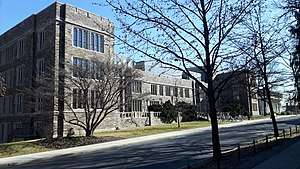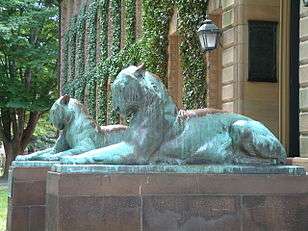Bendheim Center for Finance
Bendheim Center for Finance (BCF) is an interdisciplinary center at Princeton University. It was established in 1997 at the initiative of Ben Bernanke and is dedicated to research and education in the area of money and finance, in lieu of there not being a full professional business school at Princeton.[1]
 The Julis Romo Rabinowitz Building accommodating Princeton's Bendheim Center for Finance | |
| Founder(s) | Ben Bernanke |
|---|---|
| Established | 1997 |
| Mission | Research and education in money and finance |
| Director | Markus Brunnermeier |
| Faculty | Mark A. Aguiar, Yacine Ait-Sahalia, Sanjeev Arora, Alan S. Blinder, Markus K. Brunnermeier, Rene Carmona, Jianqing Fan, Maryam Farboodi, Harold James, Jakub Kastl, Nobuhiro Kiyotaki, Alan B. Krueger, Adrien Matray, Atif Mian, Stephen Morris, John Mulvey, Ulrich Müller, Arvind Narayanan, David Schoenherr, Mykhaylo Shkolnikov, Christopher A. Sims, Ronnie Sircar, Robert Vanderbei, Mark W. Watson, Matt Weinberg, Wei Xiong, Motohiro Yogo |
| Location | , Princeton , NJ , USA |
| Address | 20 Washington Road, Princeton, NJ 08544, USA |
| Website | bcf |
Mission
Bendheim Center for Finance pushes the frontier in research and teaching in money and finance to serve our global society by supporting a technologically modern and stable international financial architecture.[2]
Faculty
While most of the Bendheim Center's faculty comes from Princeton's department of economics, the center also draws its faculty from other fields such as psychology, computer science, and operations research.[3]
The Bendheim Center for Finance's current and past faculty have been honored with prizes, fellowships, and awards.[4] The Nobel Prize in Economic Sciences has been awarded to Daniel Kahneman (2002), Paul Krugman (2008), and Christopher Sims (2011).[5] The John Bates Clark Medal has been given to Yuliy Sannikov in 2016.[6] Sannikov (2015) and Harrison Hong (2009) have been awarded the Fischer Black Prize.[7] Markus Brunnermeier obtained the Germán Bernácer Prize (2008).[8] Daniel Kahneman has been honored with the Presidential Medal of Freedom (2013).[9] Markus Brunnermeier (2004) and Wei Xiong (2012) won the Smith Breeden Prize. Atif Mian (2010) and Markus Brunnermeier (2013) won the Distinguished Paper Brattle Prize.[10]
Various faculty members have been named Fellow of the Econometric Society,[11] Fellow of the National Academy of Sciences, Fellow of the Society for Industrial and Applied Mathematics,[12] Fellow of the Institute of Mathematical Statistics,[13] Distinguished Fellow of the American Economic Association,[14] Guggenheim Fellow,[15] or Sloan Fellow.[16]
Research
The Bendheim Center for Finance obtained a stellar academic reputation within few years, benefiting from its faculty's focus on financial imperfections and behavioral elements which experienced an unprecedented boost in public interest and academic research after the burst of the dot-com bubble in 2000. Similarly, the faculty's empirical research on housing and theories incorporating financial frictions and the financial sector into macro and monetary models contributed to the Bendheim Center's outstanding reputation as these are at the heart of the rethinking of macroeconomics, monetary economics, financial regulation, and the international financial architecture triggered by the great recession.[17][18]
Academic programs
The Bendheim Center for Finance offers teaching and supervision to undergraduate and graduate students. The center has close ties with Princeton's Department of Economics.
Undergraduate certificate in finance
Princeton University's undergraduate students of all departments can earn a certificate attesting their proficiency in the area of finance from the Bendheim Center.[19] Prerequisites for admission focus on skills in mathematics, probability theory and statistics.[20] The two core courses deal with asset pricing and corporate finance. The elective courses cover areas such as behavioral finance, data science, portfolio theory, money and banking, financial crises, risk management, information technologies for finance, public policy, ethics in finance, and the Chinese economic and financial system.[21] Undergraduate students also have the opportunity to take part in the BCF's mentorship program, which connects students and alumni.[22] Currently, around 90 students take part in the undergraduate certificate in finance program.[23] While approximately two thirds of the students have an economics or finance background, many come from other areas including computer science, history, mathematics, and engineering.[24]
Master in finance
The master in finance program particularly addresses students aiming at a career in quantitative finance and asset management, risk management, FinTechs, macroeconomic and financial forecasting, quantitative trading, or applied research. While the program generally takes four semesters, a two-semester version is available to students with strong prior knowledge.[25] The BCF's Master in Finance puts strong emphasis on financial economics, data analysis and technology, and computational methods.[26] Due the quantitative focus of the courses, the master program is also attractive for students with strong corresponding prior knowledge such as physicists.[27] Approximately 35 students corresponding to 5 percent of applicants are admitted to the program each year.[28] The New York Sun describes the program as a popular alternative to an MBA, particularly for students striving for a career in trading or hedge funds.[29]
Ph.D. program
The BCF does not offer a distinct Ph.D. program, but provides a home for Ph.D. students in economics, operations research, mathematics, and further fields who are interested in finance-related topics.[30] In addition to supervision, the BCF offers courses on finance and related topics.[31] The center also hosts a weekly student research workshop.[32]
Seminars, lecture series, and conferences
In addition to the student research workshop, the BCF hosts a weekly finance seminar. The center organizes the "Princeton Finance Lectures" delivered by one outstanding finance scholar each year. In the past years, lectures were given by Raghuram Rajan, Jeremy Stein, Ben Bernanke, Andrei Shleifer, Robert Shiller, Robert Engle, Robert C. Merton, and Lars Peter Hansen.[33] The BCF regularly hosts conferences. Past conferences dealt with topics such as escalating risks in China and FinTech.[34] Each year, the BCF co-organizes the "Princeton Initiative: Macro, Money and Finance", which brings together about 75 Ph.D. students from various universities to explore the latest research at the intersection between macro, monetary, and financial economics.[35] In the center's career speaker series, guests from industry, government, and academia cover a broad range of topics, addressing both graduate and undergraduate students.[36]
References
- "About the Bendheim Center". Bendheim Center for Finance.
- "Mission Statement". Bendheim Center for Finance. Retrieved January 23, 2018.
- "Faculty". Bendheim Center for Finance. Retrieved January 23, 2018.
- "Prizes and Awards". Bendheim Center for Finance. Retrieved January 29, 2018.
- "Nobel Laureates in Economics". Nobel Media AB. Retrieved January 29, 2018.
- "Clark Medalists". American Economic Association. Retrieved January 29, 2018.
- "Fischer Black Prize". American Finance Association. Retrieved January 29, 2018.
- "Bernácer Prizewinners". Bernázer Price. Retrieved January 29, 2018.
- "President Obama Names Presidential Medal of Freedom Recipients". The White House, Office of the Press Secretary. August 8, 2013. Retrieved January 29, 2018.
- "Smith Breeden and Brattle Prize Winners". American Finance Association. Retrieved January 29, 2018.
- "Econometric Society Fellows". The Econometric Society. Retrieved January 29, 2018.
- "SIAM Fellows by Last Name". Society for Industrial and Applied Mathematics. Retrieved January 29, 2018.
- "IMS Fellows". Institute of Mathematical Statistics. Archived from the original on 2014-03-02. Retrieved January 29, 2018.
- "AEA Distinguished Fellows". American Economic Association. Retrieved January 29, 2018.
- "All Fellows". John Simon Guggenheim Memorial Foundation. Archived from the original on March 22, 2019. Retrieved January 29, 2018.
- "Past Fellows". Alfred P. Sloan Foundation. Retrieved January 29, 2018.
- Justin Lahart (May 16, 2008). "Bernanke's Bubble Laboratory". The Wall Street Journal. Retrieved July 24, 2008.
- Michael Corkery (September 2, 2010). "Ben Bernanke's Labor Day Reading List". The Wall Street Journal. Retrieved September 3, 2010.
- "Undergraduate Certificate in Finance". Bendheim Center for Finance. Archived from the original on 2018-01-31. Retrieved January 29, 2018.
- "Admission to the Undergraduate Certificate in Finance". Bendheim Center for Finance. Retrieved January 29, 2018.
- "Undergraduate Certificate in Finance Courses". Bendheim Center for Finance. Retrieved January 29, 2018.
- "Undergraduate Mentorship and Placement". Bendheim Center for Finance. Archived from the original on 2017-07-13. Retrieved January 29, 2018.
- "Undergraduate Certificate in Finance Alumni". Bendheim Center for Finance. Retrieved January 29, 2018.
- "Undergraduate Certificate in Finance Students". Bendheim Center for Finance. Retrieved January 29, 2018.
- "Master in Finance". Bendheim Center for Finance. Retrieved January 29, 2018.
- "Master in Finance Courses". Bendheim Center for Finance. Retrieved January 29, 2018.
- Michael Price (August 3, 2012). "Physicists Learn a Trade". Science Magazine. Retrieved January 29, 2018.
- "Master in Finance Recruiting". Bendheim Center for Finance. Archived from the original on 2017-10-14. Retrieved January 29, 2018.
- Liz Peek (June 20, 2006). "Princeton's Finance Program A Popular Alternative to MBAs". The New York Sun. Retrieved March 8, 2017.
- "For Ph.D. Students". Bendheim Center for Finance. Retrieved January 29, 2018.
- "Ph.D. Courses". Bendheim Center for Finance. Retrieved January 29, 2018.
- "Student Research Workshop". Bendheim Center for Finance. Retrieved January 29, 2018.
- "Seminars". Bendheim Center for Finance. Retrieved January 29, 2018.
- "Conferences". Bendheim Center for Finance. Retrieved January 29, 2018.
- "Initiatives". Bendheim Center for Finance. Retrieved January 23, 2018.
- "Career Speaker Series". Bendheim Center for Finance. Retrieved January 29, 2018.
